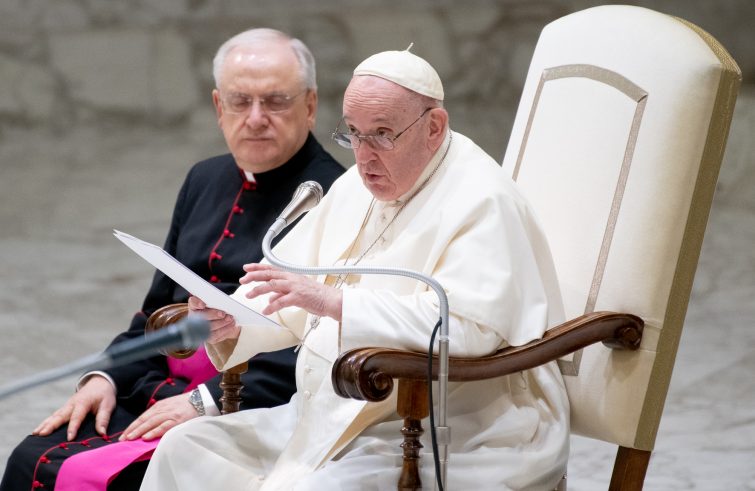
Upon the conclusion of the Wednesday general audience in Paul VI Hall, Pope Francis condemned last Saturday’s missile attack in Dnipro, which caused many civilian victims, among them children: “the images and the accounts of this tragic episode are a strong appeal to all people of conscience. One cannot remain indifferent!” the Pope said, reiterating his call to “pray for the tormented Ukraine, which sorely needs solidarity, comfort and, above all, peace.” The first public act made by Jesus after the years of his hidden life in Nazareth, was at the heart of Francis’ second catechesis dedicated to apostolic zeal.
“Jesus does not work a great wonder, he does not send an effective message, but he mingles with the people who were going to be baptized by John”,
Francis said in his opening remarks, recalling that every day, “after praying, Jesus dedicates his entire day to the proclamation of the Kingdom of God and dedicates it to people, above all to the poorest and weakness, to the sinners and to the sick”
For him, “to be a shepherd was not just a job,
but it required time and a lot of dedication. It was a true and proper way of life: twenty-four hours a day, living with the flock, accompanying them to pasture, sleeping among the sheep, taking care of those who were weakest.”
“Jesus does not do something for us, but he gives everything, he gives his life for us. He has a pastoral heart. He is a shepherd for all of us”,
the Pope said, pointing out that “o evaluate our “pastoralness” we need to confront ourselves with the model, confront ourselves with Jesus the Good Shepherd.” “Above all, we can ask ourselves: do we imitate him, drinking from the wells of prayer so that our heart might be in harmony with his?”.
“By staying with Jesus, we discover that his pastoral heart always beats for the person who is confused, lost, far away”, Francis remarked: “And ours?”.
“How many times – he continued in unscripted remarks – do we express our attitude about people who are a bit difficult or with whom we have a bit of difficulty: ‘But it’s their problem, let them work it out….’ But Jesus never said this, never. He himself always went to meet all the marginalized, sinners. He was accused of this – of being with sinners so that he might bring God’s salvation precisely to them.” “If we want to train our apostolic zeal, we should always have chapter 15 of Luke before our eyes”, the Pope’s advice: “Read it often. We can understand there what apostolic zeal is. There we discover that God does not remain contemplating the sheep pen, nor does he threaten them so they won’t leave. Rather, if one leaves and gets lost, he does not abandon that sheep, but goes in search of it. He does not say, “You got up and left – it’s your fault – that’s your business!” .
“The pastoral heart suffers and the pastoral heart takes risks”,
Francis said: “God suffers for those who leave and, while he mourns over them, he loves even more. The Lord suffers when we distance ourselves from his heart. He suffers for all who do not know the beauty of his love and the warmth of his embrace. But, in response to this suffering, he does not withdraw, rather he takes a risk. He leaves the ninety-nine sheep who are safe and ventures out for the lost one, thus doing something both risky and unreasonable, but consonant with his pastoral heart which misses the one who left, the longing for someone who has gone away.”
“Jesus teaches us to have nostalgia for those who have left”,
the Pope said highlighting the topical relevance: “Jesus does not feel anger or resentment but pure longing for us. Jesus feels nostalgic for us and this is God’s zeal.” “And I wonder – we, do we have similar sentiments?”, Francis asked. “Perhaps we see those who have left the flock as adversaries or enemies. ‘She lost her faith…. They are going to hell…’ and we are serene. When we meet them at school, at work, on the streets of our city, why don’t we think instead that we have a beautiful opportunity to witness to them the joy of a Father who loves them and has never forgotten them?”, the proposal: “Not to proselytize, but so that we can walk together. To evangelize is not to proselytize. To proselytize is something pagan, it is neither religious nor evangelical. There is a good word for those who have left the flock and we have the honour and the burden of being the ones to speak that word. Because the Word, Jesus, asks this of us –
to always draw near to everyone with an open heart,
because he is like that. Perhaps we have been following and loving Jesus for some time and have never wondered if we share his feelings, if we suffer and we take risks in harmony with Jesus’ heart, with this pastoral heart, close to Jesus’ pastoral heart!” “This is not about proselytism, as I said, so that others become ‘one of us’ – no, this is not Christian. It is about loving so that they might be happy children of God”, the Pope said: “In prayer, let us ask the grace of a pastoral heart, an open heart that draws near to everyone, so as to bear the Lord’s message as well as to feel Christ’s longing for them. For without this love that suffers and takes risks, our lives do not go well. If we Christians do not have this love that suffers and takes risks, we risk pasturing only ourselves. Shepherds who are shepherds of themselves, instead of being shepherds of the flock.”










